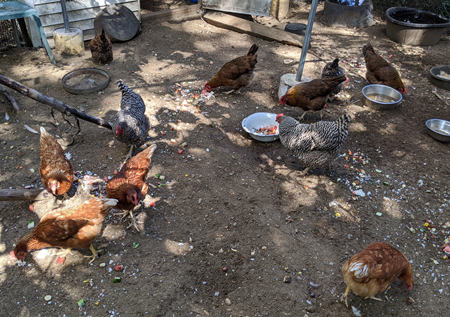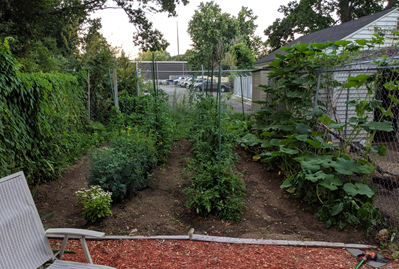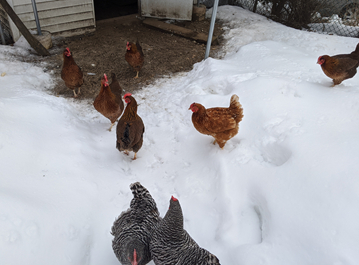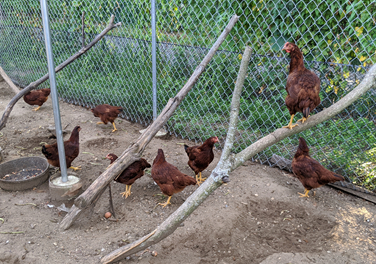
Home >> Newsletters >> GreenFriends Newsletters >> Q2 2022 GreenFriends Newsletter
| Home | Source Reduction | Friends of Green Friends | Newsletters |
| Gardening | Resources | What You Can Do | Embracing The Trees |
| Hens, Seva, Eco-Friendly Living and Fun |
 |
|
In episode three of From Amma’s Heart, she narrates how her mother raised chickens for their eggs. She said, "There are people who live off raising 10-20 chickens. If they get 20 eggs a day, they make 20 rupees, they spend 15 rupees on food, that means they make a profit of 5 rupees per day. When a hen starts laying eggs again, she saves the family depending upon her." Eleven years ago, my mother passed away unexpectedly. Sadness and grief spiraled into depression. I am grateful to share how the gifts of hen seva and Qigong helped to lift my depression. A few months into my depression, I met Dr. Wu, who is a Tai Chi and Qigong Master, a doctor of Traditional Chinese Medicine, and a 20th generation herbalist from Southern China. I started taking his Qigong classes. Qigong is an ancient Chinese practice of body movements which encourages oxygenation in the blood. These movements aid in bringing the organs and systems into balance, creating an internal flow of wellness. Dr. Wu received Amma’s darshan at her Boston program a few years ago. Throughout the years, I have had the blessing to learn from him how people survive in the countryside of Southern China through a combination of vegetable, rice, and herb farming along with raising chickens. I was immediately in awe of Dr. Wu’s vegetable and herb garden. He was growing eggplant, squash, bok choy, broccoli rabe, peppers, green beans and traditional Chinese herbs. His hen coop looked like a double shed with two windows. The person taking care of the hens was in the process of relocating out of state. Dr. Wu asked me if I was interested in tending to the hens in his absence. |
 Dr. Wu's garden |
| When I asked Dr. Wu if I could interview him for GreenFriends North America, he was happy to make time for me.
I hope this interview with Dr. Wu will spark an interest in exploring the simplicity of raising chickens. |
| Lovelle: Why did you choose to raise chickens?
Dr. Wu: In the countryside of southern China, everyone grows the food they eat and raises their own chickens. We did not have electricity, or refrigerators, and we walked a mile to the well to get water. The hens we grew were for egg-laying and not for meat. Every meal was fresh. Lovelle: Where do you source your chicks and how many do you raise? Dr. Wu: I raise 12 chicks, and purchase them locally from a farm less than 10 miles from here. Which is a minimal carbon footprint. Lovelle: Do you sell the eggs? Dr. Wu: No, the hens do not produce enough eggs to sell. At my clinics we serve fresh lunch to our patients with eggs from our hens and vegetables from our garden. Lovelle: What are your greatest challenges in raising chickens? Dr. Wu: Predators. I have lost many hens to racoons, hawks and fisher cats. The pen is now caged by metal wire from above and around the parameters of the pen. With those layers of protection, we can leave the coop door open. Lovelle: What do you do with the hen poop? Dr. Wu: I have a compost area in the back of the yard. It takes 2-3 years before I can use the poop for fertilizer in the garden. Lovelle: What do you feed the hens? Dr. Wu: It depends on who is eating the eggs, I will feed the hens herbs to help improve my patient’s ability to heal. Otherwise, they are fed raw/cooked rice, occasionally hard kibble from the feed store, and grass. Just like for humans, it is good for them to fast a few days a month. Lovelle: Do you have concerns about freezing temperatures in the winter? Dr. Wu: No. The coop is not heated. If the water freezes in the winter, Lovelle takes care to bring fresh water in buckets up to the coop. She also shovels the pen, allowing for the hens to come outside for sunshine during the winter days. Lovelle: In closing, do you have any advice for individuals looking to raise chickens? Dr. Wu: Always very important to check with your town or city to confirm that raising chickens is allowed in your area. For me, the max is 12 chickens, as the number is determined by the space you have available for the chickens. The town animal inspector comes once a year to inspect the coop. I had a rooster, but he clucked very early in the morning, waking the neighbors. Animal control told me I needed to remove him from the premises. I took him to a farm. Therefore, my eggs are not fertilized by a rooster. The average lifespan of my hens has ranged between 7-10 years old. Having a vegetable and herb garden, along with raising hens, provides me the security to know my family will never go hungry . Lovelle: Thank you Dr. Wu for your time today. |
||||
|
||||
| Top | ||||
|
In reflecting on my hen seva over the last 10 years I developed a nurturing relationship to Nature and her animals. Dr. Wu is only in Maynard two days a week. In his absence, I am responsible for cleaning and filling the water buckets, mucking up the coop stalls, cooking their food, chopping up any scraps left over from dinner and watering the garden. While I am mucking up the hens’ stalls, I feel Amma’s presence with me. I chant my mantra and my seva becomes a meditation. I often think of her as a young girl in the Kalari taking care of the cows, talking to them and wanting to be sure they are happy. Taking care of the hens is a boon; they are always happy to see me, and quick to forgive me if I am late. My depression shifted from a heart full of grief to a heart full of gratitude by becoming a steward of these hens and practicing Qigong. "Do your work and perform all your duties with all your heart. Try to work selflessly with love. Pour yourself into whatever you do. Then you will experience beauty and love in every field of your work. Love and beauty are within you. Try to express them through your actions and you will definitely touch the very source of bliss." - from Amma on Selfless Service, 8 July 2004. Dr. Wu’s clinic is located in Maynard, MA in a middle-class neighborhood. His property has come to be respected and admired by everyone in the neighborhood. Families make it a point to walk by to greet the hens. Dr. Wu’s lifestyle is eco-friendly, and I continue to learn lessons of simple eating and living from him. "When humanity serves Nature, Nature serves humanity. When we serve animals and plants, they too serve us in return." - Amma Aum Amriteswaryai Namah Lovelle - Boston, MA |
Read the Embracing the Trees Southern California update from the Q2 2022 newsletter >>
| Home | Source Reduction | Friends of Green Friends | Newsletters | Resources | What You Can Do | Embracing The Trees |
For more information, e-mail info@greenfriendsna.org |
||||||

